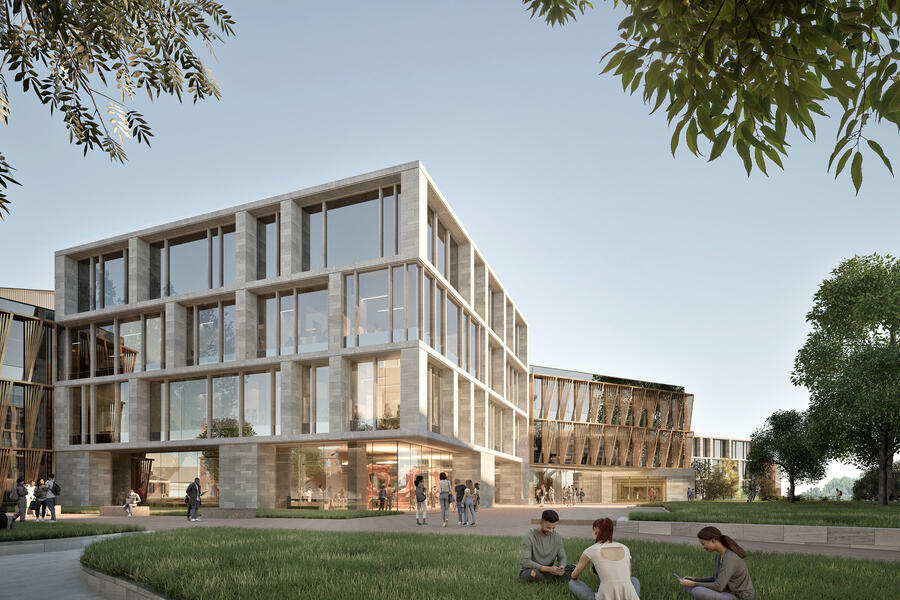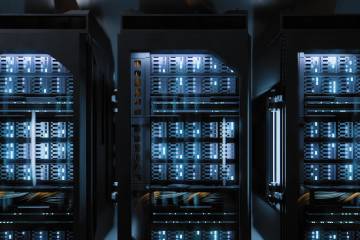- Name
- Doug Donovan
- dougdonovan@jhu.edu
- Office phone
- 443-997-9909
- Cell phone
- 443-462-2947
Johns Hopkins University presented revised plans for its new?Data Science and Artificial Intelligence?(DSAI) facility to Baltimore's Urban Planning Architecture Advisory Panel (UDAAP) on Thursday, giving the city planning group a second look at the project that will bring new investments to Baltimore and boost the economic vitality of the surrounding Remington and Wyman Park neighborhoods.
The DSAI facility will consist of two buildings—north and south—connected by a second-level skybridge. The buildings will be situated on the existing Homewood campus on either side of Wyman Park Drive, at the intersection with Remington Avenue,?next to the Wyman building and the soon-to-be-completed home of the SNF Agora Institute.?
Representatives from JHU and architect of record ZGF previously presented the project to UDAAP in April 2024. Thursday's presentation focused on design development updates made in response to questions and considerations raised during the first meeting, including the project's approach to preserving the location's natural assets through welcoming common spaces shaded by native trees, a tree-canopied dining terrace adjacent to the heavily wooded Stony Run natural area, and modification to the current gateway to the Homewood campus along Remington Avenue.
The latest renderings also highlight the use of building façade and site material options that visually connect with the existing aesthetic of the Homewood campus and surrounding communities.
The Data Science and Artificial Intelligence Institute is a cornerstone of JHU's Ten for One strategic plan and will be a leading global hub for data science and artificial intelligence research. The institute will bring together world-class experts in artificial intelligence, data science and translation, machine learning, applied mathematics, computer engineering, and computer science, to fuel discoveries in research fields across the institution, from neuroscience and precision medicine to climate resilience and sustainability, public sector innovation, and the social sciences and humanities.
On Jan. 14, as part of his budget proposal for FY26, Maryland Gov. Wes Moore announced a $2 million targeted investment to support the construction of a new multidisciplinary design center. It will connect the university's design-focused undergraduate curriculum, its new data science and artificial intelligence initiatives, and the innovation and entrepreneurship activities of Remington. Last year, the governor's budget included $20 million to support the expansion of data science and computing infrastructure. His FY26 budget still needs legislative approval.
In all, 80 new affiliated faculty will join JHU's Whiting School of Engineering to support the institute's pursuits, in addition to 30 new Bloomberg Distinguished Professors with cross-disciplinary expertise.
"This institute intends to spur a virtuous cycle of new research, product innovation, startups, private investment, and jobs," says Christy Wyskiel, senior adviser to the president for innovation and entrepreneurship at JHU. "Our vision is that researchers, entrepreneurs, investors, and companies will look to Baltimore as the place to develop and launch products and companies based on data science and AI technology."
The institute's home will replace two existing structures: the temporary facility that housed the Early Learning Center since 2015 and a chiller plant facility that until recently served the Wyman Park Precinct.
The new buildings are expected to be occupied by summer 2029.
Correction: A previous version of this article included incorrect information about the location of a new multidisciplinary design center. The Hub regrets the error.
Posted in University News
Tagged artificial intelligence, university construction, data science









